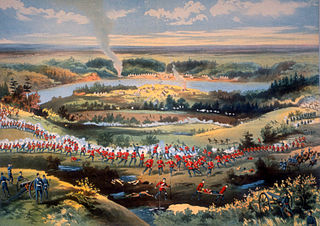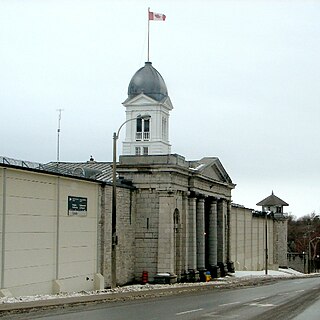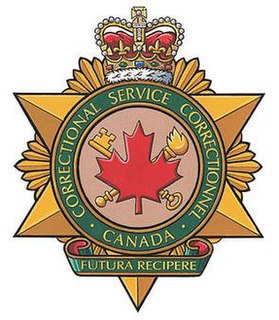
Saskatchewan is a prairie and boreal province in Western Canada, the middle of the three prairie provinces. It is bordered on the west by Alberta, on the north by the Northwest Territories, on the east by Manitoba, to the northeast by Nunavut, and on the south by the U.S. states of Montana and North Dakota. Saskatchewan, along with Alberta make up the only landlocked provinces of Canada. As of Q1 2020, Saskatchewan's population was estimated at 1,181,987. Nearly 10% of Saskatchewan’s total area of 651,900 square kilometres (251,700 sq mi) is fresh water, which is composed mostly of rivers, reservoirs, and the province's 100,000 lakes. Moderating bodies of water render severe winters throughout the province, as a result of Saskatchewan's continental climate. Southern areas have very warm or hot summers. In winter, temperatures below −45 °C (−49 °F) are possible even in the south during extreme cold snaps.

The Royal Canadian Mounted Police, often known as the Mounties, are the federal and national police service of Canada, providing law enforcement at the federal level. The RCMP also provide provincial policing in eight of Canada's provinces and local policing on a contract basis in the three territories and more than 150 municipalities, 600 Indigenous communities, and three international airports. The RCMP do not provide active provincial or municipal policing in Ontario or Quebec. However, all members of the RCMP have jurisdiction as a peace officer in all provinces and territories of Canada. Despite the name, the Royal Canadian Mounted Police are no longer an actual mounted police service, with horses only being used at ceremonial events.

The North-West Rebellion of 1885 was a rebellion by the Métis people under Louis Riel and an associated uprising by First Nations Cree and Assiniboine of the District of Saskatchewan against the Canadian government. Many Métis felt that Canada was not protecting their rights, their land, and their survival as a distinct people.

The On-to-Ottawa Trek was a result of the unrest of unemployed single men in federal relief camps. Federal relief camps were brought in under Prime Minister R. B. Bennett’s government as a result of the Great Depression. The Great Depression crippled the Canadian economy and left one in nine citizens on relief. The relief, however, did not come free; the Bennett Government ordered the Department of National Defence to organize work camps where single unemployed men were used to construct roads and other public works at a rate of twenty cents per day. The men in the relief camps were living in poor conditions with very low wages. The men decided to unite and in 1933, and led by Arthur "Slim" Evans the men created Workers' Unity League (WUL). The Workers' Unity League helped the men organize the Relief Camp Workers' Union.

Prince Albert is the third-largest city in Saskatchewan, Canada, after Saskatoon and Regina. It is situated near the centre of the province on the banks of the North Saskatchewan River. The city is known as the "Gateway to the North" because it is the last major centre along the route to the resources of northern Saskatchewan. Prince Albert National Park is located 51 km (32 mi) north of the city and contains a wealth of lakes, forest, and wildlife. The city itself is located in a transition zone between the aspen parkland and boreal forest biomes. Prince Albert is surrounded by the Rural Municipality of Prince Albert No. 461, of which it is the seat, but is politically separate.

Kingston Penitentiary is a former maximum security prison located in Kingston, Ontario, Canada, between King Street West and Lake Ontario.

Moose Jaw is the fourth largest city in Saskatchewan, Canada. Lying on the Moose Jaw River in the south-central part of the province, it is situated on the Trans-Canada Highway, 77 km (48 mi) west of Regina. Residents of Moose Jaw are known as Moose Javians. The city is surrounded by the Rural Municipality of Moose Jaw No. 161.

Ralph Edward Goodale is a Canadian diplomat and retired politician who has served as the Canadian High Commissioner to the United Kingdom since April 19, 2021.

The Correctional Service of Canada, also known as Correctional Service Canada or Corrections Canada, is the Canadian federal government agency responsible for the incarceration and rehabilitation of convicted criminal offenders sentenced to two years or more. The agency has its headquarters in Ottawa, Ontario.
Saskatchewan Penitentiary is a Medium Security Facility with Maximum Security areas. It is located on a walled 20-acre parcel of land in the Rural Municipality of Prince Albert No. 461, one kilometre west of Prince Albert, Saskatchewan, Canada. It opened in 1911 built on the site of a former residential school run by the Anglican Church of Canada.

The Winnipeg Police Service is the police force of the city of Winnipeg, Manitoba, Canada.

The history of Regina, Saskatchewan, the capital of the Canadian province of Saskatchewan. Prior to the province's establishment, Regina served was the territorial headquarters of the then-North-West Territories and district headquarters of the territorial district of Assiniboia.

Law enforcement in Canada consists of public-sector police forces that are associated with and commissioned to the three levels of government: municipal, provincial, and federal. In addition, many First Nations reserves have their own police forces established through agreements between the governing native band, province and the federal government. Most urban areas have been given the authority by the provinces to maintain their own police forces. Seven of Canada's provinces and all three territories, in turn, contract out their provincial or territorial law-enforcement responsibilities to the Royal Canadian Mounted Police, the national police force, which is commissioned to the federal level of government; the other three maintain provincial police forces, although one also partially contracts out to the RCMP. The Canada Border Services Agency (CBSA) is the second largest law enforcement agency in Canada. The CBSA facilitates the flow of legitimate travellers and trade. The agency also enforces more than 90 acts and regulations. Since December 2003, the CBSA has been an integral part of the Public Safety Portfolio. The president of the CBSA reports directly to the Minister of Public Safety Canada and controls and manages all matters relating to the agency
In Canada, the criminal legal system is divided into federal and provincial/territorial jurisdictions. Provincial/territorial correctional services are only concerned with offenders who have been sentenced for less than two years, whereas federal corrections—facilitated by Corrections Canada—is concerned with offenders who have been sentenced for two years or more.
Darryl Hickie is a Canadian politician. He was elected to represent the electoral district of Prince Albert Carlton in the Legislative Assembly of Saskatchewan in the 2007 election. He is a member of the Saskatchewan Party.
There are numerous heritages and cultural attractions in the province of Saskatchewan. Museums, dinosaur digs, aboriginal cultural and heritage sites, art galleries, professional sport venues, spas, handcraft, antique and tea shops, agricultural tours, theatre and archaeological sites comprise over 600 varied Saskatchewan institutions.

The Alberta Sheriffs Branch is a provincial law enforcement agency overseen by the Ministry of Justice and Solicitor General of the province of Alberta, Canada. Under the authority of the Peace Officer Act, Alberta Sheriffs are provincial peace officers with jurisdiction over the province of Alberta. The Premier of Alberta has the authority to grant emergency police powers to all Alberta Sheriffs in the case of any major emergencies that occur within the province. The Alberta Sheriffs Branch is the largest sheriff service in Canada.

The Alberta Provincial Police (APP) was the provincial police service for the province of Alberta, Canada from 1917 to 1932. The APP was formed as a result of the Royal North-West Mounted Police (RNWMP) leaving the prairie provinces during the First World War due to a lack of sufficient resources in light of its increased responsibilities for national security and reluctance to again enforce Prohibition law recently put into effect by the Alberta government after its experience doing so during territorial times. The RNWMP was replaced by the newly created Alberta Provincial Police on March 1, 1917, which remained responsible for provincial policing until 1932, when it was eliminated as a cost-cutting measure during the Great Depression. The APP was known for its tumultuous beginning, battles against rum-runners and bootleggers during prohibition in Canada and the United States, as well as its remarkable efficiency and professionalism which endeared to the force to Albertans.
Aimé Simard was a Canadian contract killer who worked for the Hells Angels, and for a Hells Angels puppet club, called the Rockers. The Rockers operated out of Montreal, Quebec, Canada.














